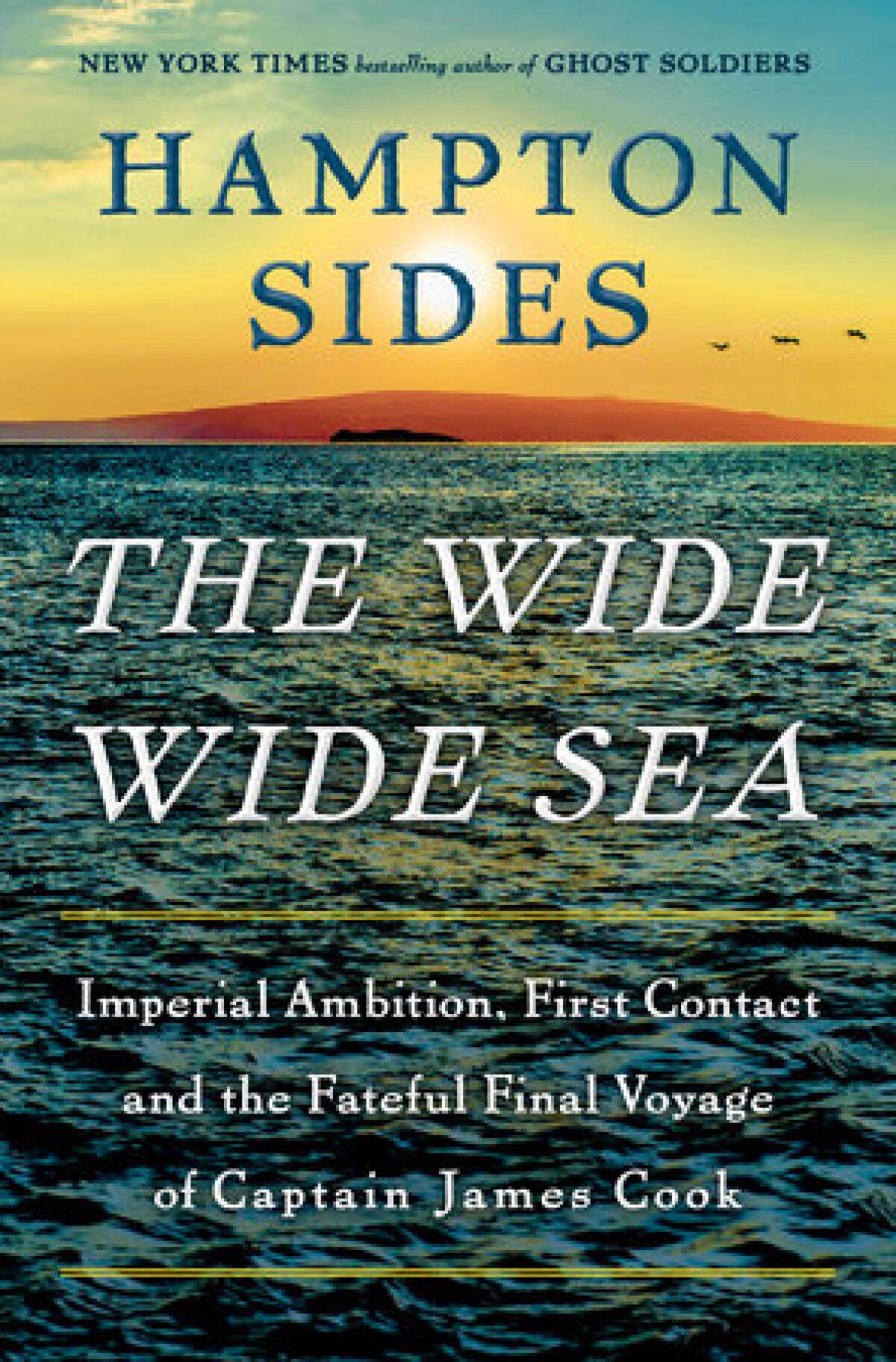Book Review
The Wide Wide Sea: Imperial Ambition, First Contact and the Fateful Final Voyage of Captain James Cook
By Hampton Sides
Doubleday: 432 pages, $35
If you buy books linked on our site, The Times may earn a commission from Bookshop.org, whose fees support independent bookstores.
The story of Capt. James Cook’s third voyage has all the elements of a Greek tragedy — hubris, good intentions gone awry, fatal error. The English sea captain, an old man by 18th century standards, had already made two worldwide voyages of discovery when he was coaxed by his admirers into one more journey. Though his expedition touched down in some of the world’s most pristine, magical places, it set in motion their decay by introducing lethal diseases and invasive species. And finally and fatally, Cook, a brilliant leader with the mind of a strategist and the sensibilities of an anthropologist, made a huge strategic misstep that led to his gruesome death on the Big Island of Hawaii in 1779.

Since his death, countless writers and scholars have minutely examined the improbable life of Cook, who for better or worse opened the lands of the Pacific Ocean to the Western world. As the perspective on Cook’s record has shifted, evaluations have turned from eulogies to reassessments to sharp critiques of his role as advance man for the all-consuming English empire.
Now Hampton Sides, an acclaimed master of the nonfiction narrative, has taken on Cook’s story and retells it for the 21st century. In his new book, “The Wide Wide Sea,” Sides examines every aspect of Cook’s superhuman accomplishments, re-creates the largely untouched world he witnessed and weighs the strengths and frailties of both Cook and his all-too-human crew.

Hampton Sides, author of “The Wide Wide Sea.”
(Kurt Markus)
Sides, author of “Ghost Soldiers,” “Hellhound on His Trail” and “On Desperate Ground,” tapped a vast amount of source material, including the journals of Cook, his officers and his crew, and did some epic travel of his own. The result is a work that will enthrall Cook’s admirers, inform his critics and entertain everyone in between.
The purpose of Cook’s final trip — to find a sea passage through North America that would link England to the riches of Asia — was considered critical to English ambitions for empire, and on July 12, 1776, Cook, 47, set sail, just as England was becoming embroiled in war with its American colonies. His two ships, the Resolution and the Discovery, did not just maneuver around storms and shoals — they evaded Spanish and French ships determined to stop them. With Cook was Mai, a Tahitian whom Cook had picked up on a previous trip and transported to England. After several years in England as a guest of the king and object of curiosity, Mai wanted to go home.
The voyage had a rocky beginning. Shoddy repairs caused the boat to leak, the many farm animals the king had sent along as gifts to the Tahitians had to be tended to, and a disorienting fog enveloped the ships for weeks on end. But there was something more. From the beginning, Cook’s crew sensed that something was amiss about their leader. “He seemed restless and preoccupied,” Sides writes. “There was a peremptory tone, a raw edge in some of his dealings. Perhaps he had started to believe his own celebrity. Or perhaps, showing his age and the long toll of so many rough miles at sea, he had become less tolerant of the hardships and drudgeries of transoceanic sailing.”
The ships managed to get around the Cape of Good Hope to New Zealand, where Cook took on the role of homicide detective, investigating an incident during a previous voyage in which English crew members who clashed with the Maoris were killed and eaten. Cook’s dispassionate response — that the Maoris were following their own traditions of ingesting their enemies after battle — provoked a restive response in his own crew after Cook decided against any retribution.
The expedition proceeded to Tahiti, where the crew received a relatively warm welcome, witnessed impressive displays of expert seamanship by the Tahitians and reveled in their paradisiacal surroundings. But the sailors passed sexually transmitted infections to the population, and rats jumped ship and set about decimating many of the islands’ native species. Ominously, Cook’s skills as a diplomat seemed to desert him. After Tahitians on the island of Mo‘orea stole a goat, Cook grossly overreacted, looting their food and razing their villages to the ground. The crew was aghast. Sides speculates that some unnamed physical ailment was wearing Cook down.
By the time Cook’s crew left, the Tahitians were glad to see them go. With supplies restored and ships repaired, the English left Mai on an island with a country-style cottage, a few animals and a trove of useless artifacts. Then the expedition headed northwest into more uncharted territory, mapping the west coast of North America as it searched for a western entry to the Northwest Passage.
Sailing close to the top of the world, the crew basked in the summer Arctic sun and kept company with whales, seals and dolphins. “We all feel this morning as though we were risen in a new world,” wrote one officer. But they finally confronted an unnavigable Arctic ice shelf, and Cook, swallowing the bitterest of pills, knew he had failed. He turned his ships west to eastern Russia, then sailed south to Hawaii’s Big Island, where an argument over the theft of one of the expedition’s longboats escalated into Cook’s decision to take the local king hostage. It was there that Cook’s life ended and arguments over his place in history began.
Captain Cook’s story is the apotheosis of the adventure stories Sides tells so well. Humans will never lose their yearning for exploration, and Cook was the master. From the perspective of his crews, they were sailing into a void of space and time, completely cut off from the world they knew, and Cook led them successfully through the direst conditions. He was a ruthless strategist who did not hesitate to use violence to achieve his aims, and he embodied an age of colonization that eventually brought uncountable horrors. Sides has retold a story worthy of an ancient hero, that of a man of awesome power undone by his own ambitions. We know his fate, but we cannot look away.
Mary Ann Gwinn, a Pulitzer Prize-winning journalist who lives in Seattle, writes about books and authors.

